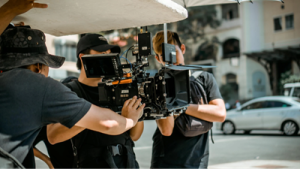The video production industry is evolving at an incredible pace, largely due to advancements in artificial intelligence (AI). AI is reshaping how videos are created, edited, and optimized for audiences, offering production companies new opportunities to streamline workflows and improve the quality of their content. As more video production companies integrate AI into their operations, understanding the latest trends is essential for staying competitive in the market.

The Rise of AI-Powered Editing Tools
Artificial Intelligence (AI) is revolutionizing video editing, offering tools that enhance efficiency and creativity. AI-powered editing software can analyze footage and automatically suggest edits based on context, color grading, and audio levels. This technology significantly reduces time spent on manual edits, allowing video production teams to focus on the more creative aspects of the project. For instance, AI tools can now analyze hours of raw footage and suggest cuts that align with a director’s previous style, making it easier to maintain consistency across projects. Moreover, some AI tools even assist with dynamic content creation, like generating personalized versions of videos for different audience segments. This capability is invaluable in marketing and social media, where content needs to be tailored to various platforms and audience preferences.
AI-Driven Scriptwriting and Content Creation
AI is also transforming scriptwriting, which is a crucial aspect of video production. While human creativity is still at the forefront, AI tools can now generate scripts, dialogue, and storyboards based on input from creators. In particular, they help with brainstorming, speeding up the process of coming up with ideas and narrative arcs. One of the most exciting applications of AI in scriptwriting is its ability to adjust scripts in real time based on audience feedback. This feedback loop can occur during live-streamed events or even after a video’s release, allowing production companies to make on-the-fly adjustments for future content. For a corporate video production company, utilizing AI-driven content creation tools can lead to more engaging and tailored videos, ensuring that client needs are met with greater precision. While AI won’t replace the creativity of a human writer, it can certainly augment the process, allowing for more innovative content development.
AI for Real-Time Data Analytics and Optimization
Another trend that video production companies should closely monitor is AI-driven real-time data analytics. With AI, it’s now possible to gather insights into viewer behavior as a video is being watched. AI tools can track metrics such as watch time, engagement rates, and even the emotional reactions of the audience. By analyzing this data, companies can optimize future videos, tailoring content to meet the preferences of their target audience more effectively. In live productions, AI can make adjustments in real time based on audience engagement. For instance, if a viewer’s attention drops at a certain point, AI can recommend changes such as faster pacing or different visuals.
Deepfake Technology and Its Ethical Implications
AI’s ability to create hyper-realistic videos through deepfake technology is both a fascinating and controversial trend. Deepfakes use machine learning algorithms to create realistic simulations of people’s faces, voices, and mannerisms, allowing video producers to craft scenes that were previously impossible or prohibitively expensive. While this has incredible potential for creative video projects, it also comes with significant ethical concerns. Video production companies must stay informed about the ethical use of deepfake technology. Misuse of deepfakes, such as fabricating events or impersonating individuals, can lead to significant legal and reputational risks.

AI is transforming every facet of the video production industry, from editing and scriptwriting to real-time data analytics and deepfake technology. For companies aiming to stay ahead of the curve, embracing these trends is essential. While AI enhances efficiency, creativity, and engagement, it’s crucial to navigate the ethical challenges that come with it. By leveraging AI responsibly, video production companies can push the boundaries of what’s possible while maintaining trust and integrity in their work.
